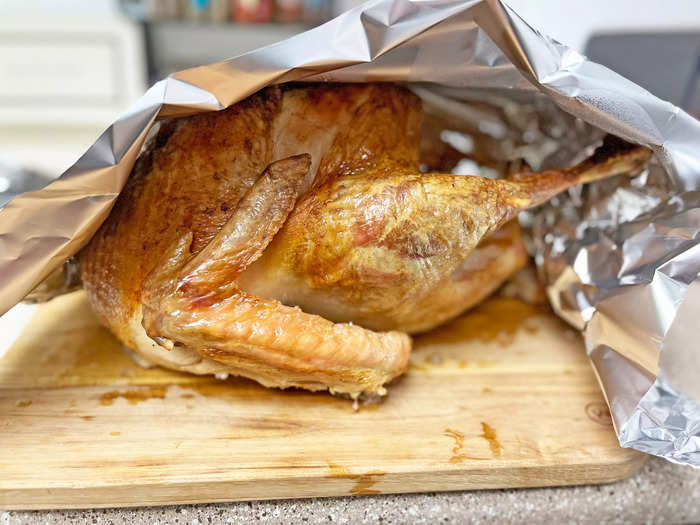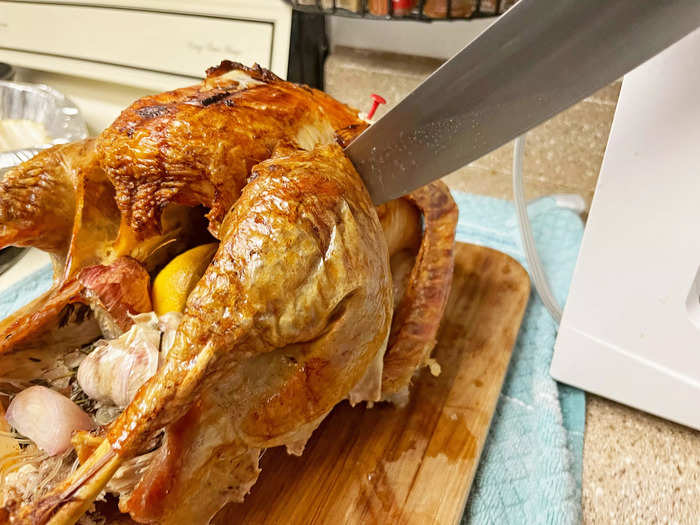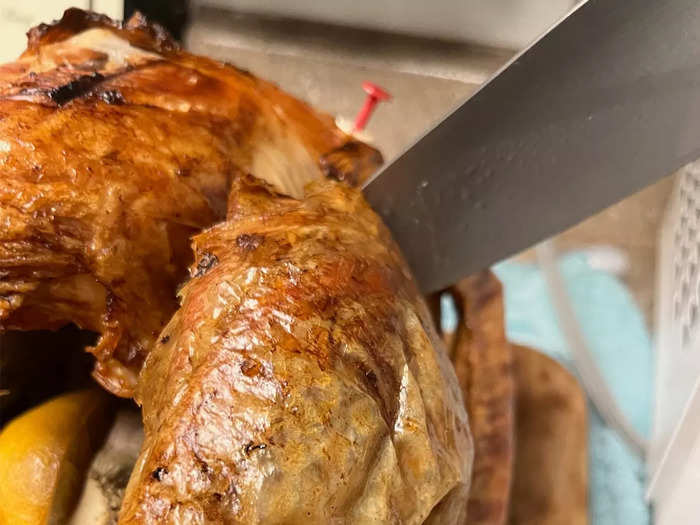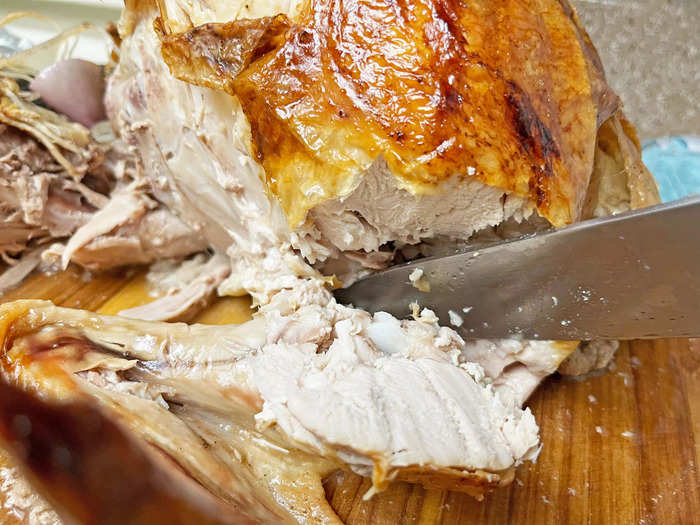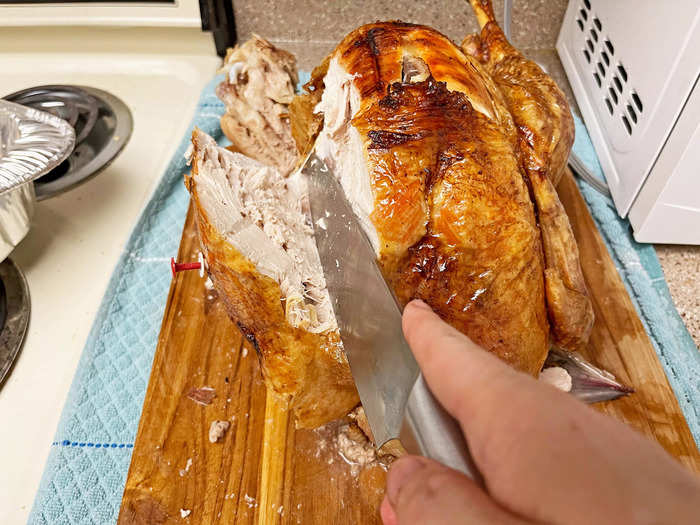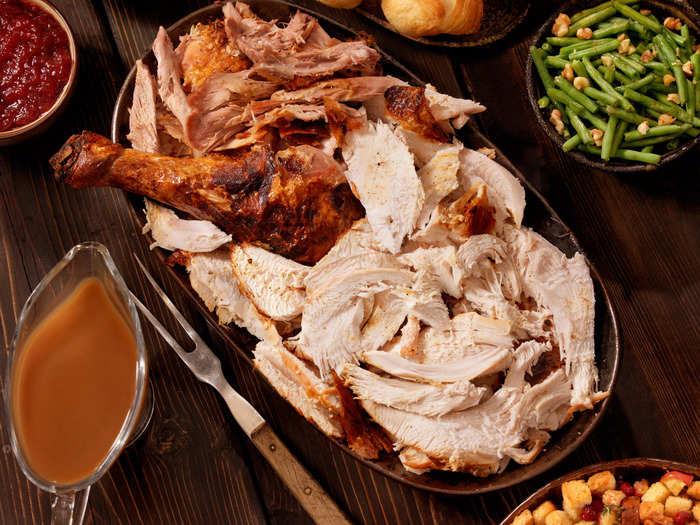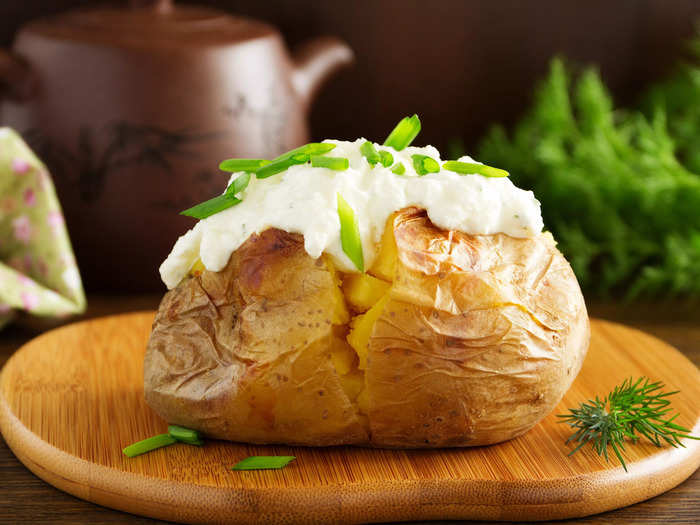The Good Brigade/Getty Images
- Roasting a turkey is only the beginning of the process; the carving is equally important.
- You'll need a sharp knife and a large cutting board, but most importantly, let the bird rest for a half hour first.
A perfectly-carved turkey is an essential element of a Thanksgiving spread. If you're not a whiz with a kitchen knife, it can be intimidating to slice up a roasted bird — especially if you're doing it table side. Turkey carving requires some precision, so if you can do it without all eyes on you (and without your opinionated relative trying to explain how you should be carving the bird), then so much the better.
To make sure we were ready for the task, we talked to chef and butcher Tony Sudak of Walden Local Meat in Boston, Massachusetts and head chef Noah Poses of The Fulton in New York City. Then, we followed their instructions to break down our own bird. Whether you're a first-time Thanksgiving host or an old pro looking to hone your skills, we've got a step-by-step guide with photos to lead you through the process of carving up a whole turkey.
What you'll need
- A very sharp knife: The most important tool for turkey carving is a knife that's as sharp as possible. If you don't have one on hand, you can use a chef's knife, says Noah Poses. However, if you don't have time or equipment to thoroughly sharpen your chef's knife or carving knife, then you'll be best served by "a brand-new serrated knife or an electric carver," says Poses.
- A large cutting board: Always cut your turkey on a cutting board big enough to hold the turkey with some extra room to maneuver, says Sudak. If you choose a cutting board that's too small, you'll end up with juices and skin scraps all over your countertop.
- A dishtowel: Laying a dish towel on the counter under the cutting board will provide you with extra stability and absorbency. Your counters (and your kitchen floors) will thank you.
- Aluminum foil: An aluminum foil "tent" will keep the turkey juicy and tender during its pre-carving, "resting" period.
- A beautiful platter: While some hosts love the showmanship of carving the turkey at the table, we recommend doing this important task in the kitchen and plating the carved pieces on a large and decorative platter before bringing it to the dining room.
Step 1: Take the turkey out of the oven and let it rest
You don't have to be precise with the foil; just make sure to cover the bird while it rests. Taylor Tobin/Insider
After you finish roasting the turkey, pull the bird out of the oven and remove it from the roasting pan. Place the whole bird on a big cutting board and set the pan to the side (you can make gravy with the drippings later). Take a sheet of aluminum foil and place it over the turkey; this "tent" will hold in moisture and prevent the meat from drying out during the carving process. Let the turkey rest for 20-30 minutes before carving.
Quick Tip: To make pan gravy, place the roasting pan with the turkey drippings over a stove burner set to medium heat. Add ½ stick of butter and whisk. Stream in a cup of white wine, whisking all the while, and then add flour one tablespoon at a time to thicken the gravy. Once it reaches the consistency you like, season with salt and pepper.
Step 2: Start with the dark meat and find the joint between the legs and breasts
Arranging the turkey so the drumsticks are facing you gives you more leverage. Taylor Tobin/Insider
After removing the foil, Sudak says that you should turn the turkey so that the drumsticks are pointing at your stomach. Next, he says to use a sharp knife to cut along the gap between the breast and the thigh. Once you've cut into that gap, "gently grab the leg and thigh and pull down towards the floor. You should hear a pop sound, which is the joint popping from the spine."
Step 3: Remove and break down the legs
The first major step in turkey carving is splitting the legs from the breast. Taylor Tobin/Insider
After you've pulled the leg free, continue to cut along the joint to remove the leg and thigh from the breast. Repeat on the other side. Next, separate the drumsticks from the thighs: "Find the joint that connects the leg and thigh together, and come down with your knife to split it. Lay those pieces whole on a serving platter and repeat with the other leg," says Sudak.
Quick Tip: After you've removed the meat from the bones, don't throw the turkey carcass away! If you toss it in a pot with water, herbs, root veggies, and aromatics (like garlic and onion) and simmer for several hours, you'll have a delicious turkey stock that you can use for soups, pot pies, and future gravies.
Step 4: Separate the wings and the breast
It is easier to slice off the breast meat if you first remove the wings. Taylor Tobin/Insider
To get to the white meat (aka the breasts), first slice off the wings at the joint between them and the breast and rest them on the platter. You can also break them into smaller pieces by following the joints.
Step 5: Cut the breast meat for serving
You can cut the breast meat thinner if you're planning to make leftover sandwiches. Taylor Tobin/Insider
Next, find the breastbone and wiggle your knife under the skin to one side to reach the breast meat. Then, cut it clean from the carcass. Place the whole breast on your cutting board and use a knife to slice it crosswise into half-inch strips. Lay the sliced strips on your platter.
Anatomy of a turkey
LauriPatterson/Getty Images
- The legs: Also known as the "drumsticks," these are located on either side of the turkey and are attached to the thighs by joints. They feature savory dark meat.
- The thighs: The sections of dark meat that separate the legs from the breasts. The thighs attach to the breasts via joints that are easy to slice with your knife.
- The breasts: The white meat sections of the turkey, which are located along the top of the roast.
- The wings: Turkeys, like chickens, feature edible wing meat, and the wings are tucked under the bird and attached to the breasts via joints.
Check out our other cooking guides
Lesyy/Getty Images

